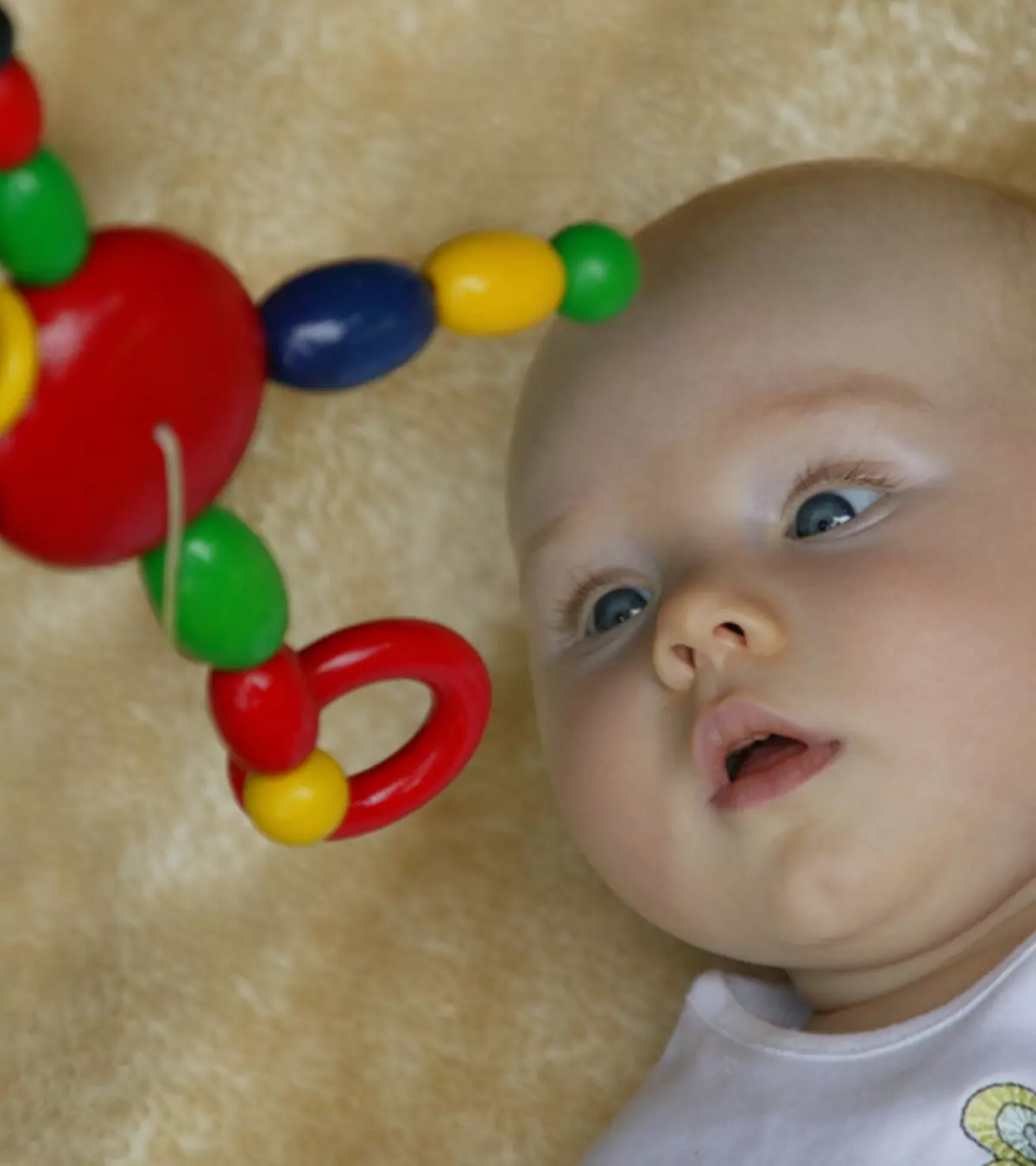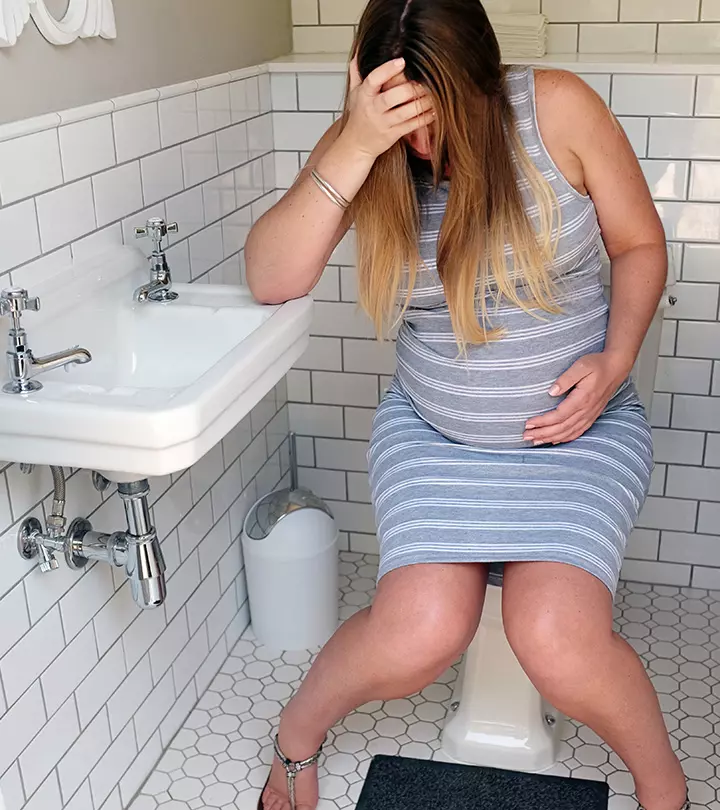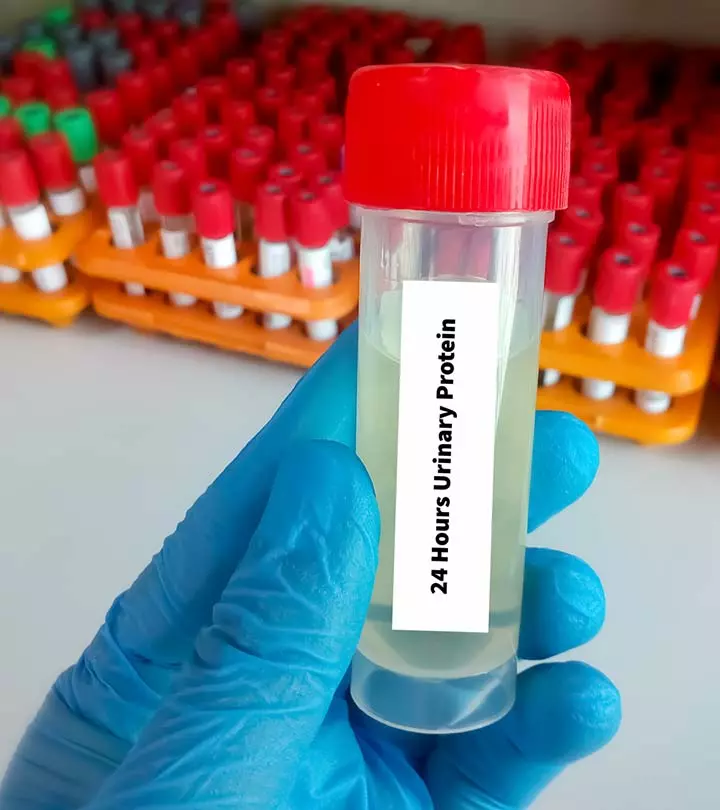
Image: Shutterstock
A change in urine color in pregnancy is among the many physical, emotional, and hormonal changes the body undergoes. Many factors may lead to a change in the urine color during pregnancy. Therefore, pregnant women should observe the changes in their urine color and report it to their healthcare provider if they notice anything unusual. Read this post to know about the normal color of urine, the color of urine during pregnancy, possible causes of a change in urine color during pregnancy, and the signs you need to see a doctor.

Key Pointers
- Urine is typically light yellow to darker yellow in color.
- Various factors such as hydration levels, dietary habits, and medication use may lead to a change in urine color during pregnancy.
- Rarely, underlying health issues such as hematuria or kidney disorders may cause changes in urine color.
- Pregnant women should monitor the color of their urine and seek medical attention if the urine color changes often or if they spot blood in urine or experience pain while urinating.
What Color Is Normal Urine?
While the color of urine differs for every person, it usually falls under the yellow spectrum (light, transparent yellow to slightly darker yellow). The hydration levels, food, drugs, and also the presence of hemoglobiniProtein in red blood cells responsible for carrying oxygen and eliminating carbon dioxide may influence the color of urine. Abnormally colored urine may be cloudy, dark, or even red (1).
What Color Is Pregnancy Urine?

The color of urine during pregnancy is dependent on hydration, diet, medications, and the woman’s health condition. The change in color is mostly due to the concentration of urochrome (end-product of hemoglobin breakdown) (2).
Apart from this, pregnancy could also cause changes in urine color.
Why Does The Urine Color Change During Pregnancy?
Several reasons could lead to a change in the urine color in pregnancy, which include:
1. Dehydration
During the first trimester, you are more likely to experience nausea and vomiting, also referred to as hyperemesis gravidarum. It could result in dehydration, which results in dark-colored urine, passed in small amounts (3).
Dr. Ralph Clayman, a urologist and former dean of the UCI Health School of Medicine, says, “The color of your urine is a great barometer of whether you’re hydrating well enough. If it’s clear or straw-colored, then you’re drinking sufficient fluid. If it becomes dark yellow or brown, then you are likely somewhat dehydrated (16).”
2. Prenatal vitamins and supplements

The different vitamins and supplements you might take during pregnancy could be affecting the urinary system, thus, causing dark urine. In the case of vitamin or supplement overdose, there could be blood in the urine (4).
 Quick fact
Quick fact3. Diet
Dietary change is the first thing you focus on during pregnancy. Some specific fruits and vegetables, such as beetroot and asparagus, alter the color of urine (5).
4. Urinary tract infections
Pregnant women are more vulnerable to urinary tract infections. Various institutes conducted cross-sectional analyses, revealing that the overall prevalence of reported urinary tract infections (UTIs) during pregnancy was 18%. However, the incidence varied significantly between study sites, ranging from 11% to 26% (17). UTIs encompass infections of the kidneys, ureters, urinary bladder, and urethra. The signs of UTI include frequent urination, a burning sensation in the lower abdomen, and the presence of blood and mucus in the urine, all of which can lead to bright-colored or cloudy urine when pregnant (6).
 Be watchful
Be watchful5. Kidney disease
Kidneys filter and excrete wastes from the body. Any infections or kidney dysfunction might cause dark-colored urine (7).
6. Kidney stones

Though a rare condition during pregnancy, kidney stones interfere with the normal functioning of the kidneys and might cause abdominal pain, nausea, and vomiting along with blood in the urine (8).
7. Hematuria
This is a condition where the red blood cells leak into the urine, giving it a dark brown to red tinge (9). This could be due to infections, stones, tumorsiAbnormal growths of cells that can be benign (non-cancerous) or malignant (cancerous) occurring in any part of the body , use of blood thinners, some metabolic disorders interacting with food intake, trauma, or blood vessel issues.
Dr. Alan R. Lindemann, MD, MS, an obstetrician and a former clinical associate professor at the University of North Dakota, says, “With liver problems in pregnancy, the color of urine would most likely have a green tint because bilirubiniA yellow pigment found in the bile and blood, produced by the breakdown of red blood cells in the liver is a green and black color.” Bilirubinuria or unusual presence of bilirubin in the urine may be checked through a bilirubin urine test as a part of urinalysis.
 Did you know?
Did you know?Dark urine during pregnancy is generally not a cause for concern and occurs due to dehydration, diet, medications, and medical conditions. However, it is best to approach your doctor if dark urine is associated with symptoms such as weight loss, pain, and blood in urine or stools. Such symptoms require timely diagnosis and treatment.
When Should You See A Doctor?

Check with your doctor if you see (1) (18):
- A persistent change in urine color
- Blood in urine
- Clear, dark-brown urine
- Bubbly or frothy urine
- Other urine colors, such as pink or orange, especially when color changes due to food or medicine is ruled out
- Signs of UTI, such as cloudy and strong-smelling urine, severe pain while urinating, frequent urination, and vomiting (19)
Dr. Ralph Clayman says, “Dark brown doesn’t always mean disease. It could be that you’re extremely dehydrated. But if you take in more fluid and it remains brown, then it is concerning and you should pay a visit to your physician. Of course red is really most concerning. It’s a literal and figurative red flag and should never be ignored. See your doctor (16).
” Your doctor may check your health history and recommend a urinalysis and blood tests. The urinalysis will check for red blood cells, white cells, protein levels, bacteria, urinary pH, and any other particles that are present in the urine through a urine-specific gravity test (20). Blood tests could help determine the levels of liver enzymes and kidney functioning. The results would provide a clue as to why there is a change in urine color.
Why Is A Urine Test (Urinalysis) Done During Pregnancy?
A urine test is an important part of your prenatal care as it helps monitor your body’s sugar and protein levels. In addition, this test is also performed to assess the potential risks of conditions such as dehydration, kidney or bladder infections, preeclampsia, gestational diabetes, and UTI during pregnancy (10).
A dipstick is the most commonly used testing method for urinalysis and is efficient in detecting possible UTIs, helping reduce neonatal and maternal complications (11).
Frequently Asked Questions
1. What causes dark urine during pregnancy?
The dark color of urine might signify dehydration (12). You may not worry unless the urine is accompanied by bleeding or pain. It is better to consult the doctor for any guidance.
2. Is a urine test necessary during pregnancy?
Yes, getting your urine checked during pregnancy can help determine conditions such as UTI, gestational diabetes, or preeclampsiaiA serious pregnancy complication characterized by high blood pressure and protein in the urine in pregnancy (13).
3. How often should I monitor my urine color during pregnancy?
During pregnancy, your urine is monitored in each prenatal checkup. Your urine sample will be taken and tested for conditions such as preeclampsia, urinary tract infections, and diabetes (14).
4. How can I ensure my urine stays a healthy color when pregnant?
Urine should preferably be pale yellow to clear, and it can be attained by drinking plenty of fluids, especially water. You may also add water-rich fruits and vegetables to your diet to prevent dehydration. The American Pregnancy Association recommends pregnant women drink 8-12 glasses of water a day (21). Also, good hygiene practices should be maintained to prevent UTIs during pregnancy (19). If you notice any unusual changes in your urine color, don’t hesitate to contact a healthcare professional for advice.
Normal urine is yellowish in color. Changes in urine color in pregnancy are usually harmless and not a cause for concern. Common causes may include hormonal changes, dietary inclusion of some colored fruits and vegetables, vitamins or other supplements. In addition, dehydration due to morning sickness may concentrate urine and alter its normal color. However, seek medical advice if you observe other symptoms such as the presence of blood, stomach ache, or pain while urinating, as they may indicate underlying conditions or even a kidney stone.
Infographic: Why Does The Urine Color Change During Pregnancy
Urine color changes could be relatively common in pregnant women for usually not-so-serious underlying causes. However, if other symptoms accompany a change in urine color, there could be a medical reason for it. The infographic below explains some common reasons that may lead to pregnancy-related urine color changes. Illustration: Momjunction Design Team
Illustration: Urine Color In Pregnancy Why It Changes And When To Worry

Image: Dall·E/MomJunction Design Team
References
1. Urine – abnormal color; U.S. National Library of Medicine (2017)
2. Validation of a urine color scale for assessment of urine osmolality in healthy children; National Institutes of Health
3. Pregnancy sickness (nausea and vomiting of pregnancy and hyperemesis gravidarum); Royal College of Obstetricians and Gynaecologists
4. Prenatal Multivitamins; Regents of the University of Michigan (2018)
5. Red, brown, green: Urine colors and what they might mean; Harvard Health Publishing (2018)
6. Blood in urine; National Health Service (NHS) (2017)
7. Susan Hou M.D; Diagnostic Tests in Renal Disease; Loyola University Medical Center
8. Kidney Stones in Pregnancy; University of Michigan Health System (UMHS) (2014)
9. Hematuria; University of California, Los Angeles (UCLA) Health
10. Getting a Pregnancy Urinalysis: About Prenatal Urine Tests; American Pregnancy Association (APA)
11. D Schlembach;Urine analysis in pregnancy; PubMed; (2006)
12. What The Color of Your Pee Says About You; Cleveland Clinic
13. What tests will I have during pregnancy?; Tommys
14. What tests might I need during pregnancy?National Institute of Child Health and Human Development
15.What The Color Of Your Urine Can Tell You About Your Health; NAFC
17. Candice Y Johnson et al.; Characteristics of women with urinary tract infection in pregnancy; Journal of women’s health (2025).
18. Urine Changes; Cleveland Clinic
19. UTI During Pregnancy; Cleveland Clinic
20. Daniel A. Queremel Milani and Ishwarlal Jialal; Urinalysis; StatPearls;; NIH.
21. Dehydration During Pregnancy; American Pregnancy Association (APA)
Community Experiences
Join the conversation and become a part of our nurturing community! Share your stories, experiences, and insights to connect with fellow parents.
Read full bio of Dr. Anita Gondy
- Dr. Alan Lindemann is an obstetrician and maternal mortality expert, who worked as a clinical associate professor at the University of ND. An alumnus of the University of ND and the University of Minnesota, he is a member of the American College of Obstetricians and Gynecologists and the American Medical Association.
 Dr. Alan Lindemann is an obstetrician and maternal mortality expert, who worked as a clinical associate professor at the University of ND. An alumnus of the University of ND and the University of Minnesota, he is a member of the American College of Obstetricians and Gynecologists and the American Medical Association.
Dr. Alan Lindemann is an obstetrician and maternal mortality expert, who worked as a clinical associate professor at the University of ND. An alumnus of the University of ND and the University of Minnesota, he is a member of the American College of Obstetricians and Gynecologists and the American Medical Association.
Read full bio of Rebecca Malachi
Read full bio of Dr. Ritika Shah
Read full bio of Reshmi Das


















